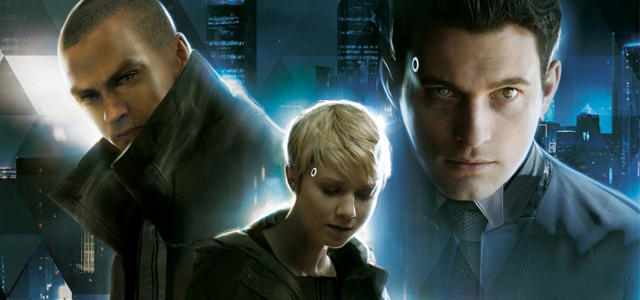Review: Detroit: Become Human
Directed by David Cage
Starring Brian Dechart, Valerie Curry, and Jessie Williams
Published by Quantum Dream
David Cage’s work is polarising. His games are branching stories where the player makes choices at key points that determine what is shown, and complex control schemes mimic real life actions. Sometimes it works, as it did in 2010’s Heavy Rain. Sometimes it falls apart at the seams as a frustrating mishmash of bad controls and ideas that don’t quite work, as happened with Beyond: Two Souls. Thankfully, Cage’s latest effort, Detroit: Become Human, marks the best use of this formula to date, telling a thoughtful story about what it means to be human.
The Detroit of this game’s world is a city that has emerged as the manufacturing capital of androids that closely resemble humans. With their artificial intelligence, these characters are part of an underclass that serve their owners by performing mundane tasks. Androids, however, have started to mysteriously turn against their owners, gaining wills of their own.
The player takes control of three characters throughout Detroit’s story: Connor (Brian Dechart), a prototype police android, Kara (Valerie Curry), a maid who works for an abusive owner, and Markus (Jessie Williams), a caretaker who gains consciousness and decides to free his fellow androids from their bondage.
Decisions players make determine aspects of Detroit’s branching storyline. There is no Game Over screen for when a character dies, they simply exit the story. While this can sometimes be frustrating (Insights accidentally killed Connor in the opening scene) it is an interesting approach that means the story is different each time. A flowchart that updates after each scene updates the player on the storyline progress, which makes it easier to trace the choices that led to certain outcomes.
Early scenes that involve doing mundane tasks in the characters’ lives serve to create empathy for their struggle. At first, it seems strange to be playing a game where the objective is to walk to the store to buy paint or to clean the house, but this well-worn David Cage trope (carried over from Heavy Rain and Beyond: Two Souls) remains a worthwhile gameplay feature that serves to introduce the player to Detroit’s world and the game’s mechanics.
Detroit’s political message underlines everything in its world building, with the androids’ poor treatment at the hands of their ‘owners’ serving as a cipher for America’s treatment of migrants and people of colour). Activist groups meet in public squares to decry the 35 percent unemployment rate and to blame androids for taking their jobs. In an early scene, a street preacher confronts Markus as being a “demon” whose false humanity is an affront to God. Androids in this game’s world are homo sacer: an ‘othered’ group, deemed to be untrustworthy and somehow responsible for the problems of majority groups.
There are times when Detroit’s political commentary is too overt or inconsistently executed (the androids standing at the back of the bus stands out as being a particularly ham-fisted). Overall, however, Detroit’s dialogue and scenarios work in getting the player to think about free will, human rights, how society shifts on who it is acceptable to marginalise, and what makes us human.
As artificial intelligence continues to be a subject of interest and speculation on film and TV (and with Saudi Arabia last year granting citizenship to an android as a publicity stunt), these are themes with considerable currency.
Detroit: Become Human is now available on the Playstation 4
Jonathan Foye is Insights’ Editor






